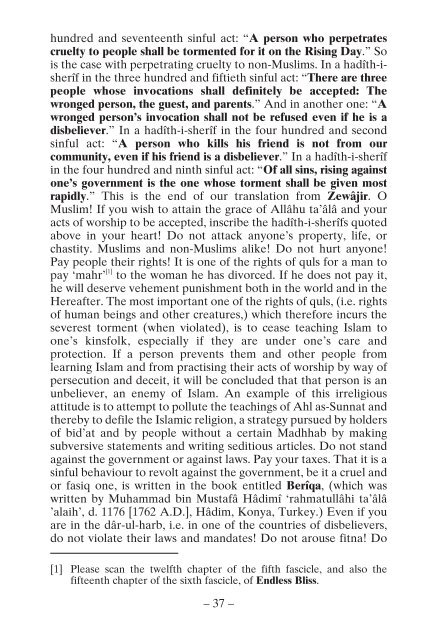Miftah-ul-Janna (Booklet for way to Paradise)
Create successful ePaper yourself
Turn your PDF publications into a flip-book with our unique Google optimized e-Paper software.
hundred and seventeenth sinf<strong>ul</strong> act: “A person who perpetrates<br />
cruelty <strong>to</strong> people shall be <strong>to</strong>rmented <strong>for</strong> it on the Rising Day.” So<br />
is the case with perpetrating cruelty <strong>to</strong> non-Muslims. In a hadîth-isherîf<br />
in the three hundred and fiftieth sinf<strong>ul</strong> act: “There are three<br />
people whose invocations shall definitely be accepted: The<br />
wronged person, the guest, and parents.” And in another one: “A<br />
wronged person’s invocation shall not be refused even if he is a<br />
disbeliever.” In a hadîth-i-sherîf in the four hundred and second<br />
sinf<strong>ul</strong> act: “A person who kills his friend is not from our<br />
community, even if his friend is a disbeliever.” In a hadîth-i-sherîf<br />
in the four hundred and ninth sinf<strong>ul</strong> act: “Of all sins, rising against<br />
one’s government is the one whose <strong>to</strong>rment shall be given most<br />
rapidly.” This is the end of our translation from Zewâjir. O<br />
Muslim! If you wish <strong>to</strong> attain the grace of Allâhu ta’âlâ and your<br />
acts of worship <strong>to</strong> be accepted, inscribe the hadîth-i-sherîfs quoted<br />
above in your heart! Do not attack anyone’s property, life, or<br />
chastity. Muslims and non-Muslims alike! Do not hurt anyone!<br />
Pay people their rights! It is one of the rights of q<strong>ul</strong>s <strong>for</strong> a man <strong>to</strong><br />
pay ‘mahr’ [1] <strong>to</strong> the woman he has divorced. If he does not pay it,<br />
he will deserve vehement punishment both in the world and in the<br />
Hereafter. The most important one of the rights of q<strong>ul</strong>s, (i.e. rights<br />
of human beings and other creatures,) which there<strong>for</strong>e incurs the<br />
severest <strong>to</strong>rment (when violated), is <strong>to</strong> cease teaching Islam <strong>to</strong><br />
one’s kinsfolk, especially if they are under one’s care and<br />
protection. If a person prevents them and other people from<br />
learning Islam and from practising their acts of worship by <strong>way</strong> of<br />
persecution and deceit, it will be concluded that that person is an<br />
unbeliever, an enemy of Islam. An example of this irreligious<br />
attitude is <strong>to</strong> attempt <strong>to</strong> pollute the teachings of Ahl as-Sunnat and<br />
thereby <strong>to</strong> defile the Islamic religion, a strategy pursued by holders<br />
of bid’at and by people without a certain Madhhab by making<br />
subversive statements and writing seditious articles. Do not stand<br />
against the government or against laws. Pay your taxes. That it is a<br />
sinf<strong>ul</strong> behaviour <strong>to</strong> revolt against the government, be it a cruel and<br />
or fasiq one, is written in the book entitled Berîqa, (which was<br />
written by Muhammad bin Mustafâ Hâdimî ‘rahmat<strong>ul</strong>lâhi ta’âlâ<br />
’alaih’, d. 1176 [1762 A.D.], Hâdim, Konya, Turkey.) Even if you<br />
are in the dâr-<strong>ul</strong>-harb, i.e. in one of the countries of disbelievers,<br />
do not violate their laws and mandates! Do not arouse fitna! Do<br />
[1] Please scan the twelfth chapter of the fifth fascicle, and also the<br />
fifteenth chapter of the sixth fascicle, of Endless Bliss.<br />
– 37 –

















